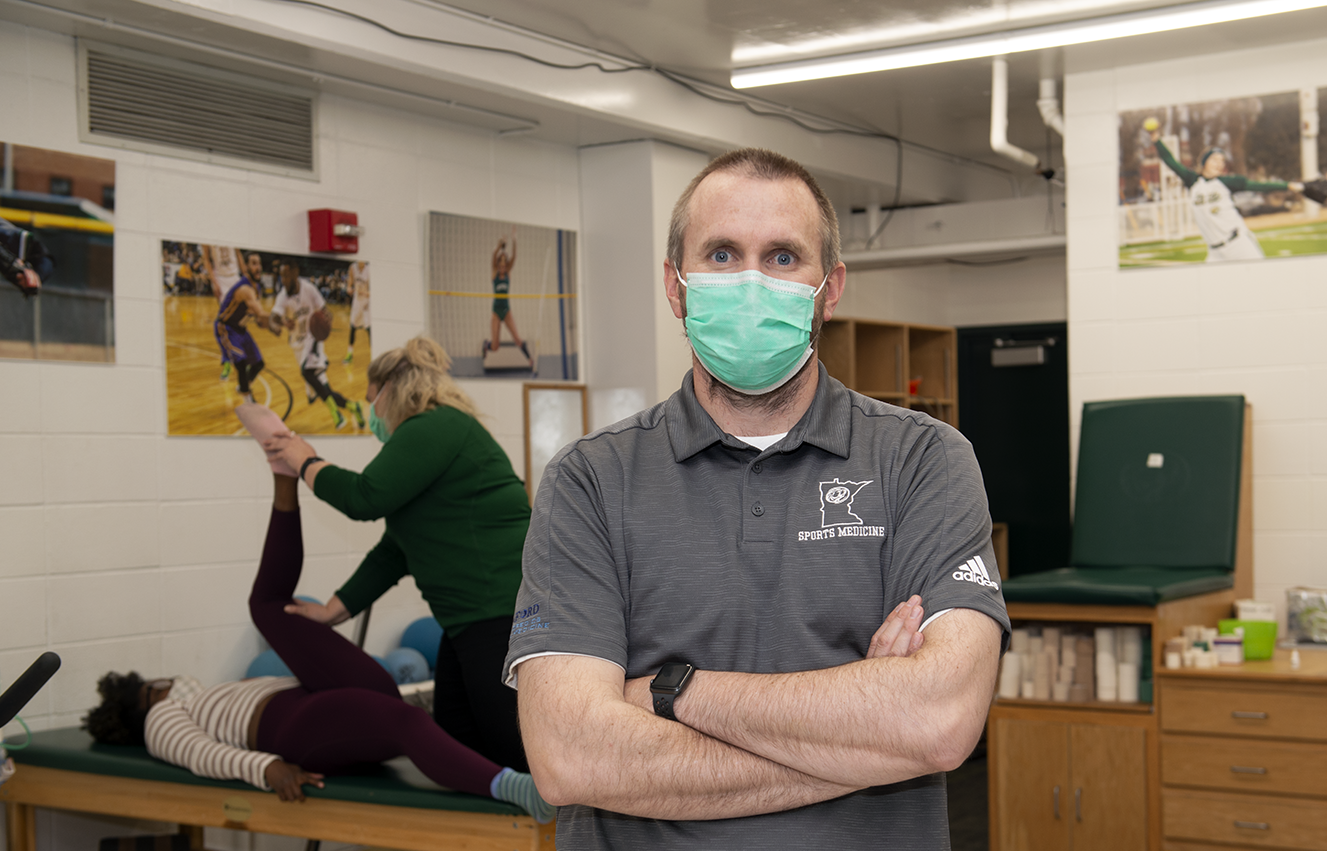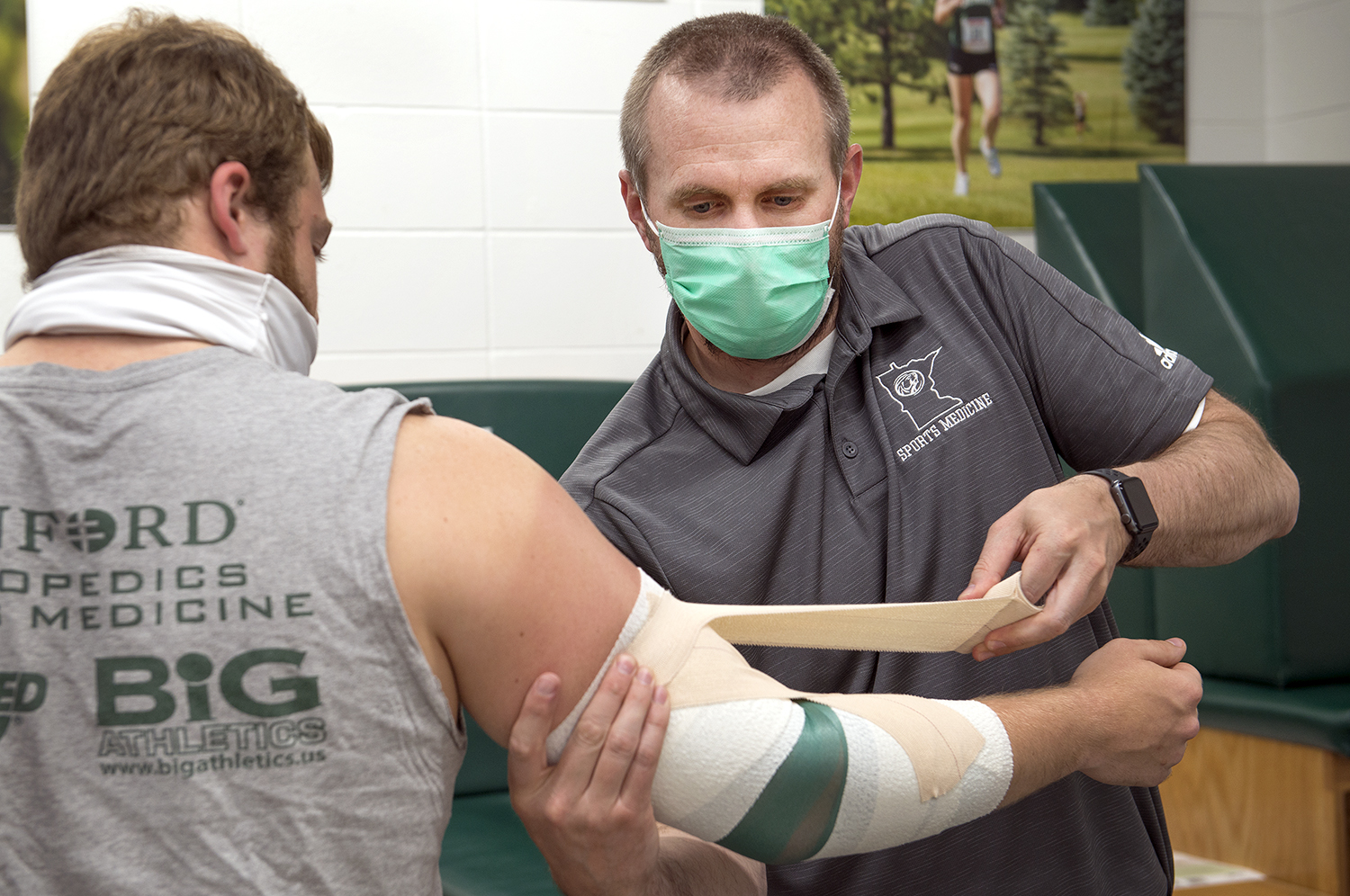
During a worldwide pandemic, BSU Head Athletic Trainer Eric Sand and his staff saw their focus shift from treating and preventing injuries on the playing field to ensuring student-athletes can get to the playing field.
Since March 2020, the BSU Athletic Training staff has been saddled with the challenges of planning safe practice and weight room strategies, interpreting Center for Disease Control, MDH and NCAA guidelines for safety, as well as developing testing, quarantine and isolation protocols — not to mention administering COVID-19 testing.
When Sand set his career course, athletic training was the perfect intersection of an interest in medicine and the enjoyment of competition with and being part of a team. This year, the pandemic stripped Sand of competition, socially distanced and, in some cases, isolated his teams and intensified his focus on medicine.
“From the time the NCAA, our conferences and BSU shut down athletics until the spring semester I hardly put a hand on a patient,” Sand said. “I have spent most of my time in meetings, learning and re-learning the newest guidance from the Minnesota Department of Health and helping coaches to make plans to safely bring teams back together.”
Athletic trainers typically evaluate injuries, implement rehabilitation programs for injured players and, in general, keep student-athletes safe and healthy. Because of this, Sand felt a sense of responsibility to do that same in this situation.
“There was really no way to know what was ahead. Everybody was learning …together,” Sand said. “Right away, I tried to get involved with as many committees as I could and attended as many meetings as I possible so that I could help give BSU athletics direction.”
From his perspective, the worst thing that could happen was for him to be left out of decisions that affected his teams.
Due to his assertiveness and affinity for medicine, Sand has become a go-to resource for interpretation of the ever-changing COVID-19 safety guidelines. His influence has not only been felt on campus, he has also been a resource for the Northern Sun Intercollegiate Conference and Western Collegiate Hockey Association as well as a consultant with local and state health organizations.
Looking back, his move to get involved not only paid off for BSU and Beaver Athletics, it helped him to grow as well.
“I think administratively this year has been great for me,” Sand said. “I have learned a lot about the inner workings of the conference and the Department of Health. I have also been in meetings and built relationships with people across BSU. Because of that, I have a better understanding of how campus functions.”
The change in Sand’s workload led to his day-to-day responsibilities for student care shifting to his staff — Bekah Hessinger, Tarrah Bisch, Heidi Krueger and Jaclyn Rudoni. In addition to athletic training duties, Sand’s staff supported testing, contact tracing, and quarantine, isolation and return-to-play duties for the teams they oversee.
“There are a lot guidelines and protocols to sort through to make sure it is safe to for the student-athletes to compete and then to return to action after a positive COVID-19 case,” Sand said. “I am really proud of the way my staff stepped up and took care of their teams.”
After more than a year defined by social distancing, meetings, testing and careful planning, Sand sees the light at the end of the tunnel. With more and more people getting vaccinated each day and recent changes in guidance set by Minnesota Department of Health, team quarantines, missed practices and competitions may soon be a thing of the past.
“We want to give these student-athletes every opportunity to compete. That is why we have worked so hard,” Sand said. “They each came to BSU to be part of a team and to compete. We will do everything we can to make sure they can do that.”

